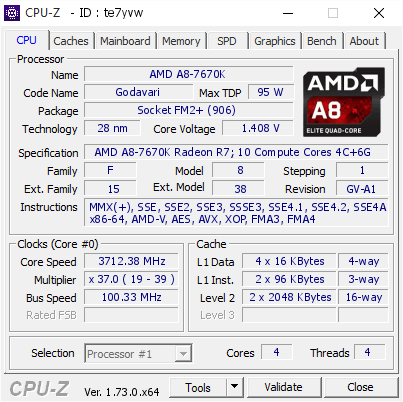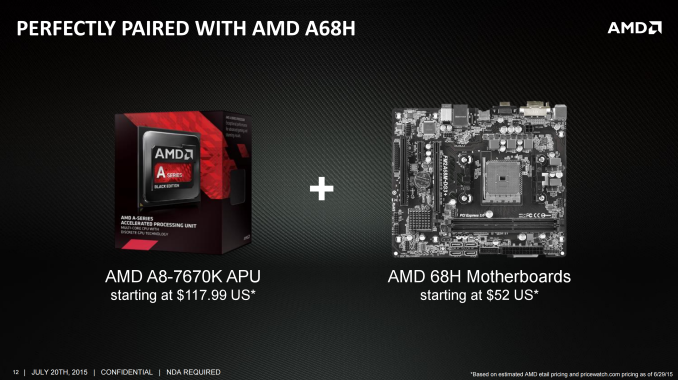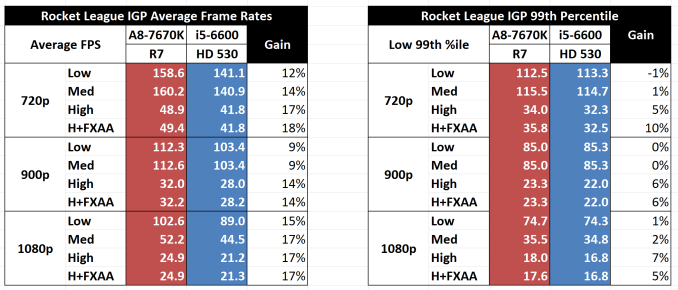The AMD A8-7670K APU Review: Aiming for Rocket League
by Ian Cutress on November 18, 2015 8:00 AM ESTAMD A8-7670K Conclusion
We have tested all of the new AMD APUs as they have trickled into the market, but there are a few obvious points that come up from comments and forums when we discuss them. To start, the base architecture in these APUs, though part of the Kaveri or Kaveri Refresh family, debuted in January 2014, making it nearly two years old. The underlying design that has been iterated upon three times for Kaveri — Bulldozer — is now four years old, released in October 2011. For all intents and purposes, because these processors are AMD’s latest desktop offerings, they are compared to Intel’s latest counterparts.
Despite AMD’s push into using their heterogeneous system architecture platform as a way to accelerate day-to-day tasks that involve any vector calculations (JPEG decode, video playback), as most benchmark workloads will show, the AMD APUs come out slower on the pure CPU aspect, and they're power-hungry due to the 28-nm lithography node on which they are produced (particularly compared to Intel's latest 14-nm node). I was at an event earlier this year where a technology journalist told AMD up front that they considered the 28-nm processors hot and slow, and that users were not likely to be interested in them.
To combat what AMD sees as an pervasive dislike of the platform, AMD has been focusing on three talking points in their marketing message in order to communicate the areas where they believe they have an advantage. This is, by its nature, a bit of a spiel on AMD's part, but at the same time, there are some nuggets of truth in these claims, as illustrated by our benchmark results.
AMD's first talking point is, of course, price. AMD considers their processors very price-competitive, especially for low-cost systems when you consider performance as a function of total system cost. AMD's second talking point is on the power-consumption issue. For some time now, AMD's line has been that they don't believe that most users think about power consumption when gaming, suggesting that for the markets they are targeting, it might not be an issue to begin with. AMD's third talking point is on graphics performance, where AMD believes that their integrated graphics (or dual graphics with an R7 discrete card) will easily win on price and performance, especially for e-sports titles currently favored by budget gamers.
For the validity of AMD's talking points, we can verify Nos. 1 and 3 with our benchmarks, dollar for dollar. Especially when a dual graphics profile for a game exists, the gaming performance will be better for the same price. However, one might argue that relatively few users use a PC just for games, and items such as JavaScript/HTML5 performance for social media interaction is also important, with this being the main barrier low-frequency APUs have to compete against (in comparison to equally priced Intel counterparts). As for talking point No. 2, it's debatable whether users really care about the power consumption of their system during gaming. A personal thought for this would be if the system fans were to spin up, then maybe it would play on the mind, especially if the system is being used to watch a film or play music. But typically, users concerned with this sort of power consumption tend to be over 25 years old and can afford to be more selective with their purchases, as opposed to e-sports gamers on tight budgets. Nevertheless, some users will wholeheartedly disagree.
Ultimately these points lie at the heart of AMD’s dilemma. On one hand, many users will avoid an APU due to specifications or experience, no matter the budget. On the other hand, AMD has a tight space to work in, but there are areas where their APUs hold an edge over Intel's CPUs. The trick for AMD right now is convincing skeptical buyers of this.
If we look beyond today’s review, everyone who cares about CPU performance is hoping that AMD's new microarchitecture in 2016, Zen, allows AMD to catch up to Intel in raw CPU performance. At present, AMD has released slides claiming a 40% increase in IPC for their new design. If AMD can deliver on their performance goals then this should significantly improve their standing as far as x86 CPU performance goes, though this will initially be aimed at the high-performance market. Otherwise for budget users or the e-sports crowd, we will have to wait and see what the Zen microarchitecture brings and how it will be implemented for APUs.
Until then, AMD's APUs still win for that Rocket League style of player, beating any equivalent Intel implementation at the same price. The A8-7670K, with a minor recent discount to $100, is essentially the center point of that APU stack, on AMD's latest process design tweaks. We overclocked our sample to 4.6 GHz, but your mileage may vary.
On a personal note, as you might expect, I build systems for my family. My father, who wanted an audio workstation, had a big enough budget to consider something with many cores and hyperthreading, focusing on low audio latency and a configuration that used software that took advantage of that. I've mentioned in these reviews that I outfitted my 15-year-old cousin-in-law with an APU and a discrete card for a small cheap dual graphics system that probably cost $400 or so. With it, he does school work, talks to his friends and plays a range of MOBA and MMO games without issues. He's rather happy with it.
For future reference, all of our regular benchmark results can also be found in our benchmark engine, Bench.














154 Comments
View All Comments
b1gtuna - Tuesday, November 24, 2015 - link
Any possibility this can run Starcraft2 on high setting at FHD?silverblue - Wednesday, November 25, 2015 - link
AMD's own internal benchmarks suggest 35fps at maximum in FHD for the A10-7870K, but I can't find anything to suggest performance of the A8-7670K.albert89 - Friday, November 27, 2015 - link
Oh dear anandtech where for art thou Carrizo in your tests ?Why is the whole tech reporting industry not using this ground breaking chip in their reviews ?
Why is everyone running scared of AMD's A10-8700P ???
LarsBars - Tuesday, December 8, 2015 - link
I really appreciate the commentary on AMD. Thanks, Ian!